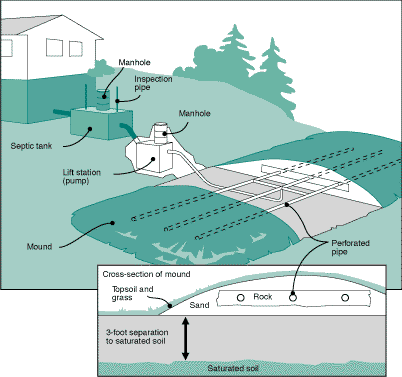When we took the University of Minnesota Extension's Living on the Land class two years ago this spring, the topic that I found most deeply disorienting was the one on wells and septic systems.
Twenty plus years ago, I attended a motivational speech I'll never forget when my college first introduced recycling bins on campus. Aside from returning glass bottles for change and smashing a few tin cans for my Grampa, I had never recycled. I remember the professor talking about how we shouldn't mindlessly throw things away because there is no magical place named Away to throw them. We should not simply pile them out of sight and hope they go Away.
Nice speech. I learned to recycle and reuse. Heck, I lived in Minneapolis where we sorted into eight different groups of recycling at the alley. There were always at least two containers in every public building- one for recycling and one for garbage. Our neighborhood sorted and collected food for compost, too, so my kids and I knew to look for three cans and instructions before throwing anything Away. There could be up to 5 different cans in some 'green' restaurants and more at the Wedge or Whole Foods for plastic bags, corks, plastic yogurt containers, etc.
However, I still turned on the tap every day and the water magically appeared and then went Away. Except now I dreamed of living in the country where, I was informed in class, I would be in charge of my own well and my own septic system. I received a septic system packet. No one had given me a "Welcome to Minneapolis- here's how you operate city sewer and water" packet. Now I got a packet plus I got an hour long lecture with slides and science.

Suddenly and unwittingly, I as a home-owner was going to be a lot more involved in my own water cycle. Cleaning and flushing safely required training. I invite you to take a look on the U of M site dedicated to septic system education and get a glimpse for yourself. Or take a look at a five minute video about it.

We left that night's class wide-eyed and subdued. This whole "learning to take responsibility and doing for ourselves" thing was a lot less shiny in practice than I'd first imagined. A well and septic system cost $20,000+ to install and if we should break, contaminate, or kill it (yes, the septic bacteria are alive) we would be responsible to pay to fix it as well as live with the consequences of poisoning ourselves and our land. Routine maintenance would also be our responsibility to schedule and pay for or calamity might ensue. We definitely were leaving the world we knew and the new one looked frightening and daunting.

Then there was the well water- hard water, water softening, salt, lime and calcium build-up- all of which I knew nothing about except for the one hour class. To top it all off, I am fussy about my water. I have had a water filter for most of my adult life because city water tastes chloriney and well water tastes worse.

We, the previously intrepid homesteaders, drove home after water night at class asking each other,"Do we still want to go through with it? What else might we not know that we don't know? What other costs and responsibilities might be lurking? If our relationship to water can change so profoundly, what else might change without warning?"
I felt like gravity had shifted under me, that my nice neat world of resources coming and going without a thought was gone forever.
No comments:
Post a Comment